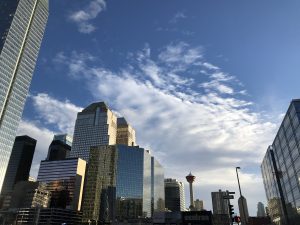Hi everyone!
My name is Charlotte and I’m in my graduating year in a double major in Psychology and English Literature. I’m looking forwards to working with all of you!
When I think about Canadian literature, I think of writing that is vast, diverse, and difficult to define. Even our most prolific writers, like Margaret Atwood, Alice Munro, Yann Martel, L.M. Montgomery, and Thomas King, explore a wide variety of topics, themes, and styles both within their own works and in comparison to each other. One criticism of Canadian Literature that I’ve heard in the past is that, as a consequence of our multicultural, geographically large country, there is not one congruent or consistent, identifiable genre within Canadian literature. One approach to this has been to study Canadian authors; however, this can even be further divided – we have Asian-Canadian writing, indigenous works, historically Canadian fiction, novels set in Canada, novels written by a Canadian but set elsewhere, among other classifications. I’m interested to see how our course approaches the ambiguity of who claims ownership to our land, stories, and literature when the boundaries are often so hard to define.
Our course seems to be tackling this notable challenge by focusing on the relationship between Canadian writing, Canadian space, place, and land, and the association between stories and literature. I’m excited to explore, in particular, some of the ways place and history impact ownership of stories – particularly through our focus on indigenous writings and the corresponding transition between story mediums.
I expect the course to be an integrative, innovative, and collaborative way of exploring not only the content of Canadian literature and stories, but also the modalities, contexts, and methodology through which they are communicated and transcribed. I’m hoping the course will be an opportunity to open myself up to authors I may not have previously read and to provide a space to learn more about indigenous works and how individuals are working to reclaim what it means to study and write Canadian Literature in new contexts. I’m also hoping to expand my understanding of how Canada’s cultural and sociological histories have decided whose stories we have favoured as legitimate Canadian literature, and what can be done to diversify this understanding in the future.
I’ve included a photo I took Calgary below; Calgary is the first place I learned to understand what it means to be Canadian and the first place I learned to identify as “home”; I’m excited to continue broadening this understanding with all of you.

Works Cited:
“What Makes Canadian Literature Canadian?” Research and Innovation, University of Toronto, 11 Nov. 2009, www.research.utoronto.ca/what-makes-canadian-literature-canadian/. Accessed 9 Jan 2019.
Smith, Russell. “Why do we struggle with what makes Canadian Literature?” The Globe and Mail, 11 May 2018, www.theglobeandmail.com/arts/books-and-media/why-do-we-struggle-with-what-makes-canadian-literature/article15536056/. Accessed 9 Jan 2019.
Whitehead, Joshua. “mâwacinikân: Moving Indigenous literature to the front in 2018.” CBC Arts, 19 Jan 2018, www.cbc.ca/arts/mawacinikan-moving-indigenous-literature-to-the-front-in-2018-1.4493517. Accessed 9 Jan 2019.

Nice to meet you Charlotte. thank you for the interesting introduction to the course. I find your discussion surrounding the lack of a unified Canadian genre in literature quite interesting. I was surprised , however, to hear that people criticized Canadian writing for being too diverse. In general, it would be hard for me to imagine any modern nation that could claim to have a unified style (or genre) of writing. Even countries with less ethnic and cultural diversity would surely have writers who write completely differently to each other. Of further interest to the discussion regarding contemporary identity was the article by Russell Smith. I mean, how can we really talk about a Canadian “genre” when the definition of citizenship is so fluid. Does owning a passport really define us as Canadian? If not, what is that definition? Does it have to do with real time spent on the land? participation in the education system? Genetic/Historical lineage?
I also found the discussion around the so called “unified” Canadian genre interesting, especially in comparison to how we as readers and writers view the classic literary genres that we grew up learning about and understanding throughout our grade school education. For example, most genres have sub-genres within them. “Fiction”, for instance, is an overarching genre that contains more defined versions of it (such as romance, horror, science fiction, and fantasy). Each sub-genre is defined by their own unique stylistic features. So why do people seem to have the need to define the Canadian literary genre as having one particular style or being uniform when the classic genres themselves are not uniform?
Hi Cassie,
Thank you for your comment. I think the idea of sub-categories is a really interesting way to approach Canadian Literature, and could be a way of considering our national literature without becoming entrapped in the argument Smith brings up (ie do we use a legislative approach or a thematic one); this seems to allow more flexibility in our definitions.
I find the common urge to try and define or create a national literature/genre an interesting one; I have some background in Psychology, where we have often discussed the human tendency to want to classify ideas, items, or creatures in a way of understanding the relationships between them. I wonder if the desire to classify a Canadian genre is a similar urge to try and connect a vast array of approaches to understanding “the Canadian experience” in a simpler set of terms. Is this genre merely a way to connect disparate ideas and shared experiences? Alternatively, is attempting to create a Canadian genre an attempt to mythologize “the Canadian experience”, and if so, what political or social motivations might underlie this attempt?
Hi Iaen,
Thank you for your thought-provoking comment. I agree that it is difficult for any modern nation to claim one cohesive narrative; that being said, it is also arguable that many countries have defining values, themes, and struggles that they choose, with intentionality, to embrace in collective memory, to promote internationally, or to celebrate, mourn, or teach. I think in particular of many countries in Europe, who, although containing diverse populations, also emphasize a sense of nationalism and unification, which is partially contributed to through the decision to collect a “national literature,” promote national poets, advertise different art and media during political engagements, etc. I want to be clear that I am not necessarily endorsing nationalism as an approach, and recognize it is very flawed and complex; I am merely drawing attention to the fact that we can say there is something distinctive about, say, French writing and culture that differentiates it from its neighbours.
The questions you’ve posed about how we identify genre without being able to identify citizenship are far too complex to answer straightforwardly here — I think the Smith article is interesting in that it challenges this ambiguity. If we define it by experience in Canada, possession of a passport, being born in Canada, or through a collective theme, the authors and works included differ. I am personally partial to a thematic approach, as I feel defining Canadian literature based on citizenship is legislating an art form. However, deciding who has the authority to decide which themes, values, or styles we use within a “national literature” raises even more difficulties that will take collaboration and thought to resolve. Hopefully we can use this course as an opportunity to move more towards a personal understanding of this question.